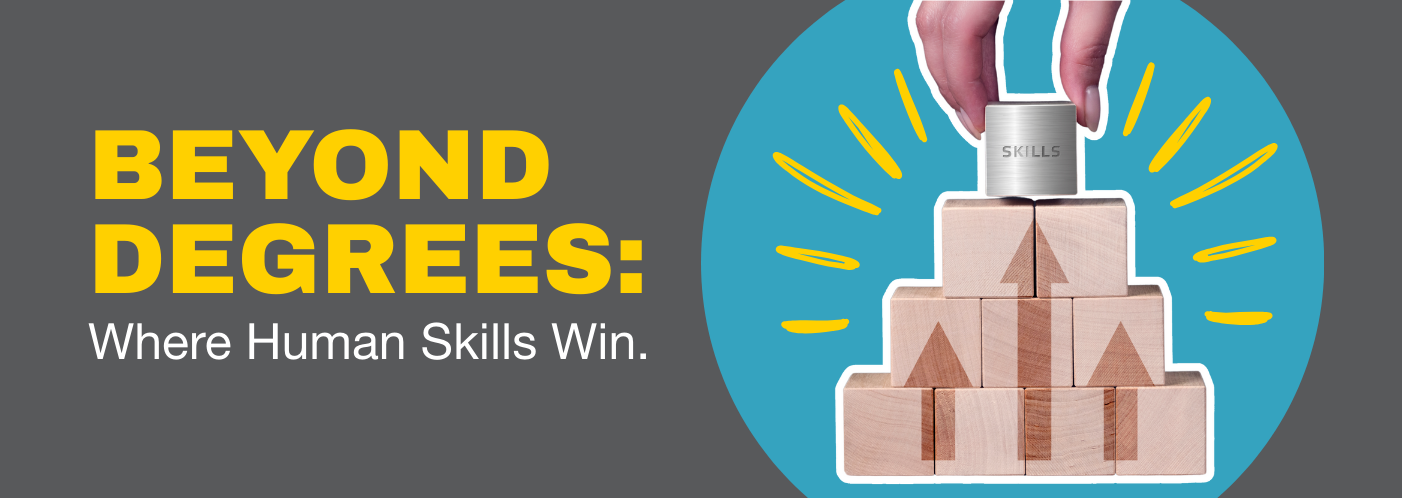Beyond Degrees: The 5 In-Demand Soft Skills for Today's Workforce
Why Emotional Intelligence and Adaptability Now Outweigh Technical Prowess

A technical skill might get you the interview, but a soft skill gets you the job—and the promotion. In a world increasingly shaped by automation and AI, the most durable and valuable assets are the uniquely human ones: our ability to communicate, collaborate, and adapt. A laundry list of credentials is no longer enough. Employers are now hiring based on a candidate’s potential to connect with others and navigate complex challenges. At Sedona Staffing, we see it every day: the candidates who thrive are those who blend technical expertise with a powerful set of soft skills.
🔍 What Are Soft Skills? Soft skills are the character traits and interpersonal abilities that define how you work and interact with others. While hard skills are the teachable, technical competencies needed to perform a job (like coding, accounting, or welding), soft skills are the intangible abilities that allow you to use that technical knowledge effectively within a team. They are the foundation of a collaborative and innovative workplace.
The five most critical soft skills in today's market are:
- Communication: The ability to clearly and concisely convey ideas, listen actively, and tailor your message to different audiences.
- Collaboration: The capacity to work effectively within a team, share responsibility, and support colleagues to achieve a common goal.
- Adaptability: The flexibility to navigate change, learn new skills quickly, and thrive in evolving environments.
- Problem-Solving: The skill of identifying complex problems, critically evaluating options, and implementing effective solutions.
- Emotional Intelligence (EQ): The ability to recognize and manage your own emotions and to understand and influence the emotions of others.
🤝 Why Soft Skills Are a Game-Changer In a competitive talent market, a workforce rich in soft skills is the ultimate advantage. Both companies and candidates see immense benefits.
For Employers: It leads to improved team cohesion, higher employee retention (people don’t leave teams they connect with), enhanced innovation, and a stronger pipeline of future leaders.
For Employees: It makes you a more competitive and sought-after candidate, unlocks opportunities for promotion, and provides a transferable skill set that is valuable in any industry or role.
✅ Five Ways to Develop and Showcase Soft Skills
- Seek Out Collaborative Projects Step outside your comfort zone and volunteer for projects that require working with different departments. This forces you to practice communication, navigate different working styles, and build relationships, all while achieving a shared objective.
- Practice Active Listening In your next meeting, make a conscious effort to listen more than you speak. Focus on understanding the other person's perspective before formulating your response. Ask clarifying questions. This simple shift is the foundation of effective communication and emotional intelligence.
- Embrace Feedback as a Growth Tool Actively ask for feedback from managers and peers, and receive it with an open mind. A willingness to learn from constructive criticism is one of the clearest indicators of adaptability and a strong EQ.
- Showcase, Don't Just Tell, on Your Resume Don’t just list "strong communicator" in a skills section. Prove it. Use your accomplishment bullet points to tell a story. Instead of "Trained new employees," try "Mentored 3 new team members on company processes, resulting in their full integration 2 weeks ahead of schedule."
- Volunteer to Lead a Small Initiative You don't need a formal title to be a leader. Offer to lead a small team meeting, organize a volunteer event, or spearhead a process improvement. This demonstrates initiative, problem-solving, and the ability to motivate others.
🌟 How It Looks in Action
Without Strong Soft Skills: ➡ A brilliant analyst creates a groundbreaking financial model but struggles to explain its significance to the sales team. When they ask questions, the analyst becomes defensive. The valuable insights are lost in translation, and the project stalls.
With Strong Soft Skills: ➡ The same analyst creates the model and then schedules a meeting where they use a simple, clear presentation to walk the sales team through the key takeaways. They actively listen to the team's concerns and adapt their recommendations, leading to a successful new sales strategy.
🗣️ Q&A
Q: Can soft skills really be learned, or are you just born with them?
A: They can absolutely be learned. Like a muscle, soft skills are developed through conscious effort, practice, and a willingness to step outside your comfort zone.
Q: How do you assess soft skills in a 30-minute interview?
A: Through behavioral questions. Instead of asking "Are you a good problem-solver?", ask "Tell me about a time you faced an unexpected obstacle at work and how you overcame it."
Q: As a job seeker, where on my resume should I put soft skills?
A: The best place to show your soft skills is in your accomplishment bullet points. Describing how you achieved a result (e.g., "Collaborated with the marketing team to...") is far more powerful than simply listing them.
Q: Which is more important: hard skills or soft skills?
A: It's not a competition; it's a combination. Hard skills prove you can do the job. Soft skills prove you can do it well with others, adapt to challenges, and grow into a leader.
📢 Final Takeaway In the modern workplace, your technical abilities are the entry fee, but your soft skills are what will make you thrive. The ability to connect, communicate, adapt, and solve problems with others is the most durable and valuable asset you can possess. The most successful companies are building their teams around these skills, and the candidates who cultivate them will have a distinct and lasting advantage.
This article is for informational purposes only and job placement or employment is not guaranteed. This article was written by our team of staffing experts. We leverage advanced AI tools to assist with research and composition, and every piece is reviewed and edited by our team.




